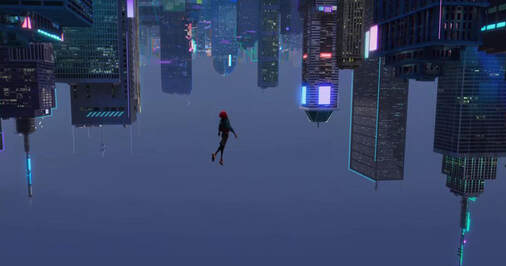B+ | Multiple versions of heroes bitten by radioactive spiders converge on the New York City of a Brooklyn teen. Directed by Bob Perischetti, Peter Ramsey, and Rodney Rothman Starring Shameik Moore, Jake Johnson, and Liev Schreiber Review by Jon Kissel |

On the producing and writing side are Phil Lord and Christopher Miller, meta masters behind the LEGO Movie and the Jump Street movies. Previously involved in LEGO Batman, arguably the best Batman film ever, Lord and Miller are now jumping comics brands and making a play for the best Spider-Man film ever. The duo knows how to comment on a genre while simultaneously create a credible entry into the same genre. Here, they recognize that superhero origins are stale and repetitive, so they zip through six of them in quick succession while taking their time with a seventh. They also imply that their characters understand that origin stories are predictable, but that doesn’t mean that the individual pain involved in them isn’t taken seriously. Lord and Miller are gifted satirists because it’s not all just jokes with them. They get the ratio of comedy to pathos right, where it’s heavily tilted towards the former but not so much that the latter is invisible.
Spider-Verse may actually have the ratio pushed too far towards pathos, because Peter Parker is killed early in the film. It just so happens that there are infinite versions of him, but the viewer doesn’t know that when his chest is stoved in by a bowling ball of a man. The film includes an effective mourning period for the hero, interspersed with Morales’ attempts to replace him as the friendly neighborhood Spider-Man. Other Spider-Man movies have him figuring everything out alone and then moving into the main conflict, but Spider-Verse instead chooses to take the stairs, effectively disabling Morales’ efforts and providing the real possibility that he could walk away from the attempt. Enter the alternate versions of Spider-Man, starting with Jake Johnson’s middle-aged depressive as a schlubby sensei. A subpar teacher, Johnson is joined by Gwen Stacy (Hailee Steinfeld), Spider-Noir (Nicolas Cage), Penni Parker (Kimiko Glenn), and Peter Porker (John Mulaney). Their combined expertise is still not enough to get Morales’ to their level, a state that he has to arrive at himself.
Spider-Verse saves its rooting interest amidst all this for Morales, Johnson’s Peter B. Parker, and villain Kingpin (Live Schreiber), with some left over for the monochromatic Spider-Noir and his quest to conquer the Rubik’s Cube. Tragedy is built in to all versions of Spider-Man, and Morales is the only one we see onscreen when uncle/evil henchman/herald of the score’s best track Aaron Davis (Mahershala Ali) is killed by Kingpin when he can’t murder his nephew. Parker’s not only lost his Uncle Ben, but in the intervening years, he’s also lost his Aunt May and his marriage to Mary Jane Watson. Kingpin himself indirectly caused the death of his family when they saw him being evil and were subsequently killed in a car crash. Comic books, and movies, all tend to mirror their protagonist and antagonist, and while the myriad versions of Spider-Man translate their losses into selflessness, Kingpin goes hard towards selfishness, putting millions at risk if it will bring back his family.
The film is most compelling with Parker, a man who doesn’t see much future for himself back in his universe and is therefore willing to sacrifice himself to save Morales’. The character himself occupies a unique place, one where having all these gifts hasn’t resulted in happiness, where his goodness gets him a lonely apartment that gets a piece of pizza stuck to its ceiling, and probably not for the first time. All those lives he’s saved might be their own reward, but he’s still depressed. Avengers: Endgame did some of this, but Spider-Verse beats them to the punch in providing a version of a superhero who’s exhausted the joyful part of it and has turned it into a workaday job, with all the ‘fulfillment’ that usually entails.
While it subverts and adheres to the superhero genre, Spider-Verse is also funny and contains several well-done fight scenes. Setpieces like the What’s Up Danger sequence are suitably thrilling, and the diversity onscreen makes sense both in the world of the film and the world it’s released into. All involved are clearly passionate about the end product. What keeps me from fully embracing what is a very good superhero outing is my distance from the comic book medium, a lack of appreciation that makes the film’s naked attempts to evoke comic books an unnecessary sop to an audience that is dominant atop the cinematic landscape. When the top four or eight movies of any given year are superhero movies, it’s no longer a niche audience that needs catering to. I also am put off by some of the more aggressive visual effects, such that when I saw this in theaters, there was momentary concern that I sat down in a 3d screening by accident. The directors could’ve pulled back the clutter in many instances and lost nothing. Spider-Man: Into the Spider-Verse has many, many qualities and most them are strong. It’s not damning that I don’t consider this the best of the genre, but instead a mostly inventive version of a formula that keeps getting iterated, not only because of creative bankruptcy, but because, a lot of the time, it works. Spider-Verse certainly works. B+
 RSS Feed
RSS Feed